




Keeping your pillows clean and fresh is an important part of maintaining good hygiene and a comfortable sleep environment. Over time, pillows can accumulate sweat, body oils, dust mites, and other allergens, which can affect their quality and your health. Many people wonder if they can toss their pillows in the washing machine to clean them. In this ultimate guide, we will explore the different types of pillows and provide you with tips on how to properly wash them.
Firstly, it’s crucial to determine if your pillow is machine-washable. While some pillows are designed to be machine-washed, others may require different cleaning methods. Check the label and manufacturer’s instructions for specific guidance. If your pillow is not suitable for machine washing, don’t fret. We will also cover alternative cleaning techniques to keep your pillows fresh without damaging them.
For machine-washable pillows, there are a few steps to follow to ensure a successful wash. It is recommended to pre-treat any stains or spots with a mild stain remover or detergent before washing. Place the pillow in the washing machine, along with a few towels or a tennis ball to help fluff the pillow during the cycle. Use a gentle cycle with warm water and mild detergent. After the wash, thoroughly rinse the pillow to remove any soap residue. Finally, make sure to dry the pillow completely before using it again. Failure to dry the pillow properly may lead to mildew or unpleasant odors.
Why Washing Pillows is Important
Washing pillows regularly is an essential part of maintaining good hygiene and ensuring a clean and healthy sleeping environment. Here are some reasons why washing pillows is important:
1. Removing Dust Mites
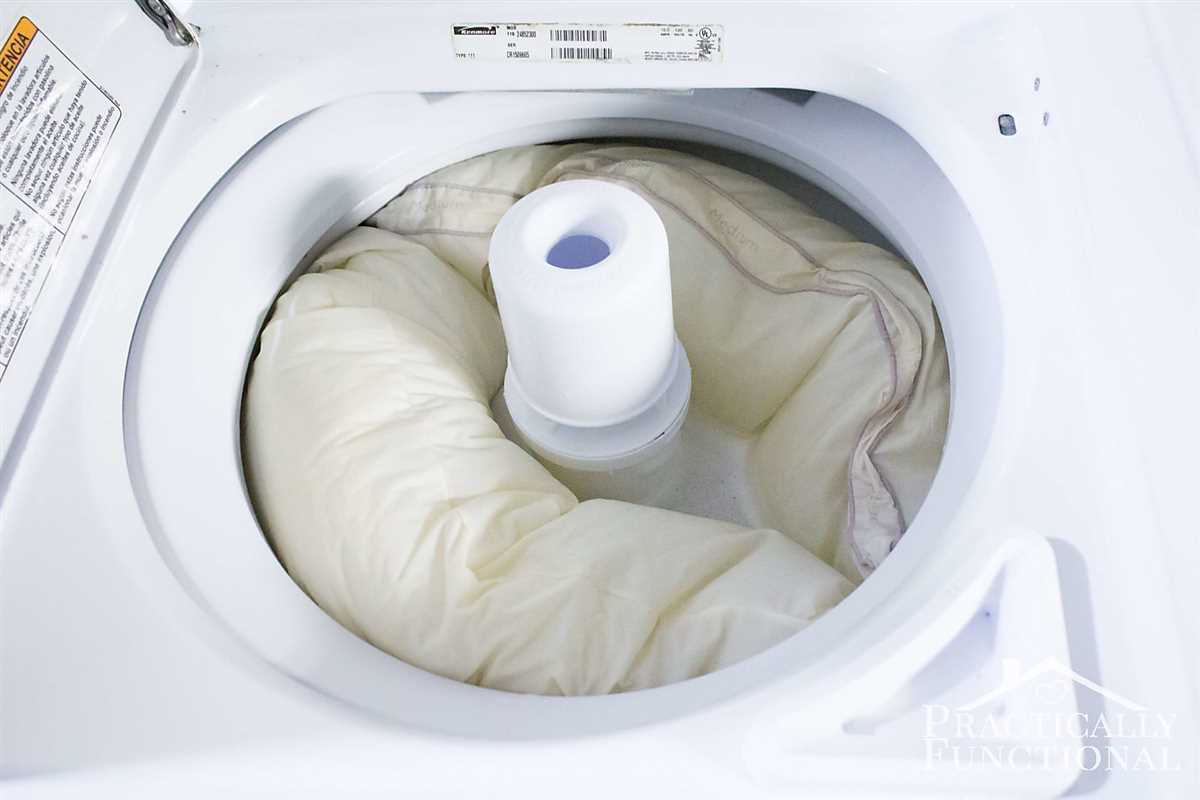
Pillows harbor a significant amount of dust mites, tiny organisms that feed on dead skin cells. These microscopic creatures can exacerbate allergies and cause breathing difficulties, especially for individuals with respiratory conditions like asthma. Washing pillows in hot water helps kill dust mites and keeps them at bay.
2. Eliminating Sweat and Body Oils
Over time, pillows absorb sweat, body oils, and other bodily fluids. This accumulation can create an environment conducive to the growth of bacteria, fungi, and other microbes. Regularly washing pillows helps remove these contaminants, preventing unpleasant odors and maintaining the overall cleanliness of the pillows.
3. Preventing Acne and Skin Issues
Dirty pillows can contribute to acne breakouts and other skin issues. The buildup of oils, dirt, and bacteria on the surface of the pillow can transfer onto the skin during sleep, clogging pores and leading to skin irritation. Regularly washing pillows helps keep the skin clean and reduces the risk of acne and other skin problems.
4. Maintaining Pillow Fluffiness
Washing pillows not only cleans them but also helps maintain their fluffiness and shape. Over time, pillows can become compressed and lose their support. Washing them helps restore their original shape and ensures they provide the desired level of comfort and support while sleeping.
5. Prolonging Pillow Lifespan
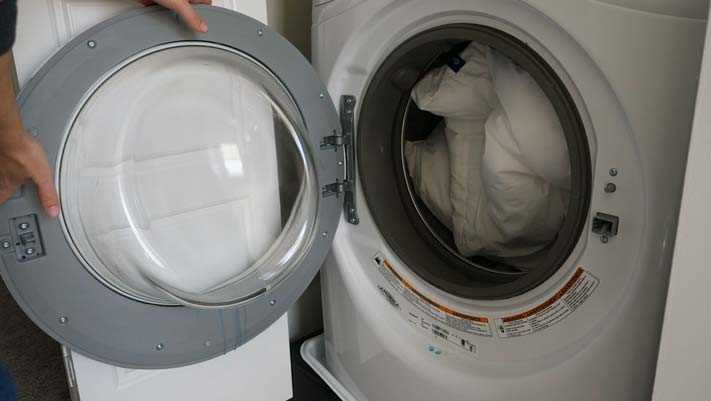
Regularly washing pillows can extend their lifespan. By removing dirt, dust, and allergens, washing helps prevent the buildup of these particles, which can degrade the pillow’s materials over time. A cleaner pillow is less likely to experience wear and tear, allowing it to last longer.
Overall, washing pillows is a simple yet important task that helps maintain hygiene, prevent allergies, and ensure a good night’s sleep. It is recommended to wash pillows at least every 6 months, or more frequently if necessary, following the manufacturer’s instructions for care.
The Different Types of Pillows and Their Washing Requirements
Pillows come in various types and materials, and each type may have different washing requirements. It’s important to follow the care instructions provided by the manufacturer to ensure that your pillows stay clean and in good condition. Here are some common types of pillows and how to wash them:
1. Synthetic Pillows
Synthetic pillows are often made from polyester or a blend of polyester and other synthetic materials. These pillows are generally machine washable and can be washed in warm water with mild detergent. Tumble dry on low heat or air dry for best results. Avoid using high heat, as it can damage the filling.
2. Down Pillows
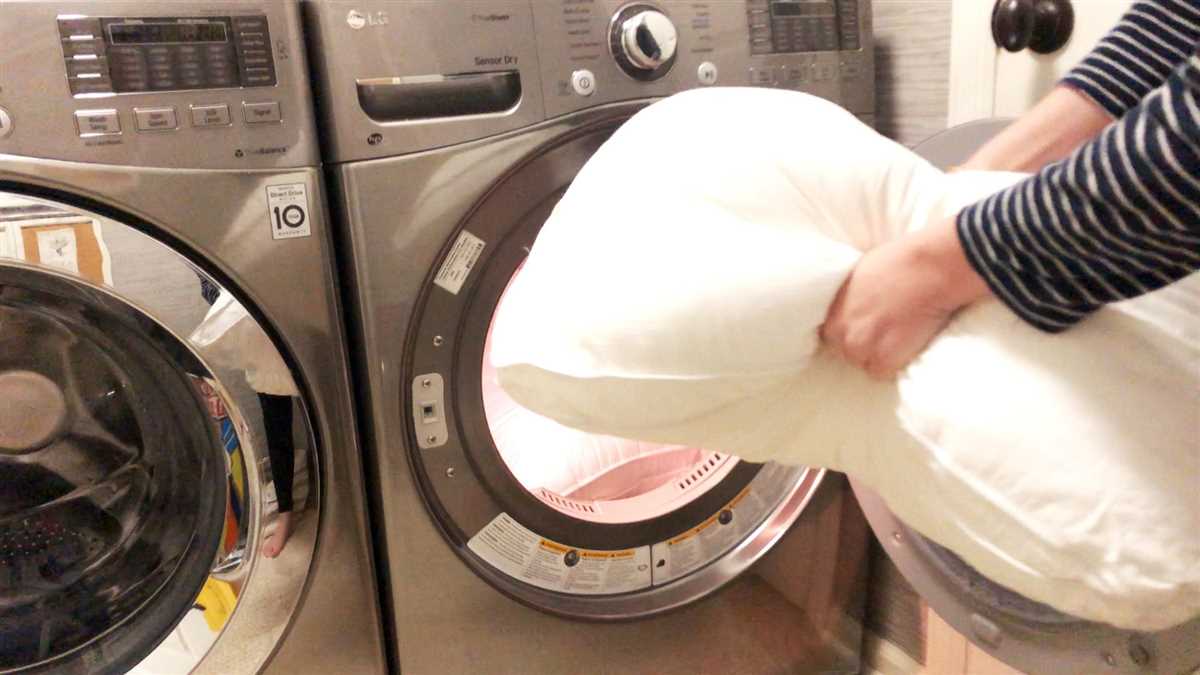
Down pillows are filled with the soft, fluffy feathers found underneath the outer feathers of ducks and geese. Care instructions for down pillows can vary, so it’s essential to check the label. Most down pillows can be washed in a front-loading washing machine on a gentle cycle using mild detergent. To maintain the fluffiness, dry the pillows on low heat with a few clean tennis balls or dryer balls to help fluff up the feathers.
3. Memory Foam Pillows
Memory foam pillows are known for their ability to conform to the shape of your head and neck. However, they require special care when it comes to washing. Most memory foam pillows cannot be machine washed or soaked in water, as this can damage the foam. Instead, spot clean any stains with a mild detergent and water solution. Allow the pillow to air dry completely before using it again.
4. Bamboo Pillows
Bamboo pillows are made from bamboo-derived materials, which are known for their natural properties such as being hypoallergenic and breathable. Most bamboo pillows can be machine washed on a gentle cycle with mild detergent. However, it’s important to check the care label to ensure that machine washing is recommended. Air drying is usually recommended for bamboo pillows to preserve their quality and integrity.
5. Feather Pillows
Feather pillows are filled with feathers from ducks or geese, similar to down pillows. Care instructions for feather pillows are typically the same as down pillows. However, it’s important to check the label to confirm the specific washing instructions, as some feather pillows may have different requirements.
6. Cotton Pillows
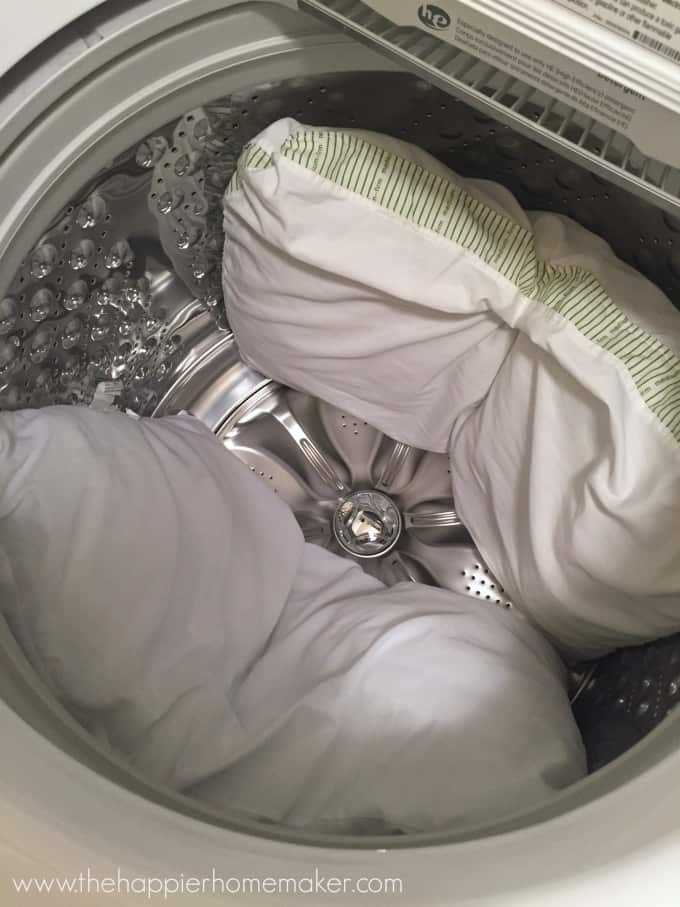
Cotton pillows are filled with cotton fibers and are relatively easy to clean. Most cotton pillows can be machine washed on a gentle cycle with mild detergent. Tumble dry on low heat or air dry. Make sure the pillow is completely dry before using it, as dampness can lead to mold or mildew growth.
Remember to always check the care label and follow the manufacturer’s instructions for washing pillows. Additionally, using pillow protectors and regular cleaning can help prolong the life of your pillows and keep them fresh and hygienic.
Step-by-Step Guide: How to Wash Pillows in the Washing Machine
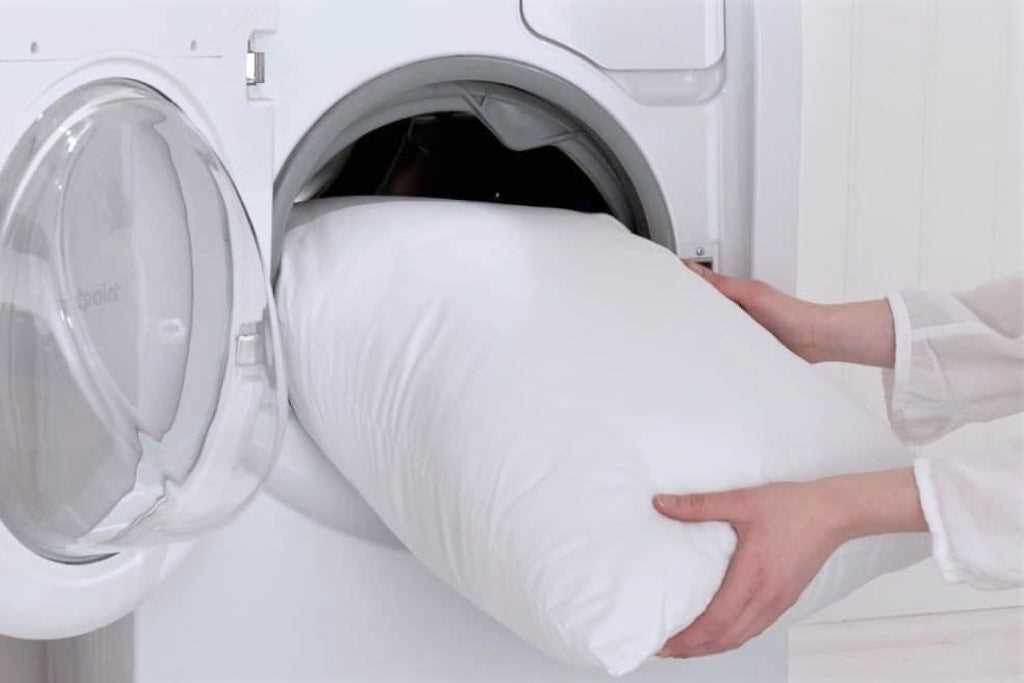
Step 1: Check the Care Label
Before washing your pillows, always check the care label for any specific instructions. Some pillows may need to be dry cleaned or may have other special instructions that you should follow. If the care label allows for machine washing, then you can proceed to the next step.
Step 2: Remove the Pillowcase
Take off the pillowcase from the pillow. If there are any protective covers or shams, remove those as well. Washing these separately will ensure they are cleaned thoroughly.
Step 3: Spot Treat Stains
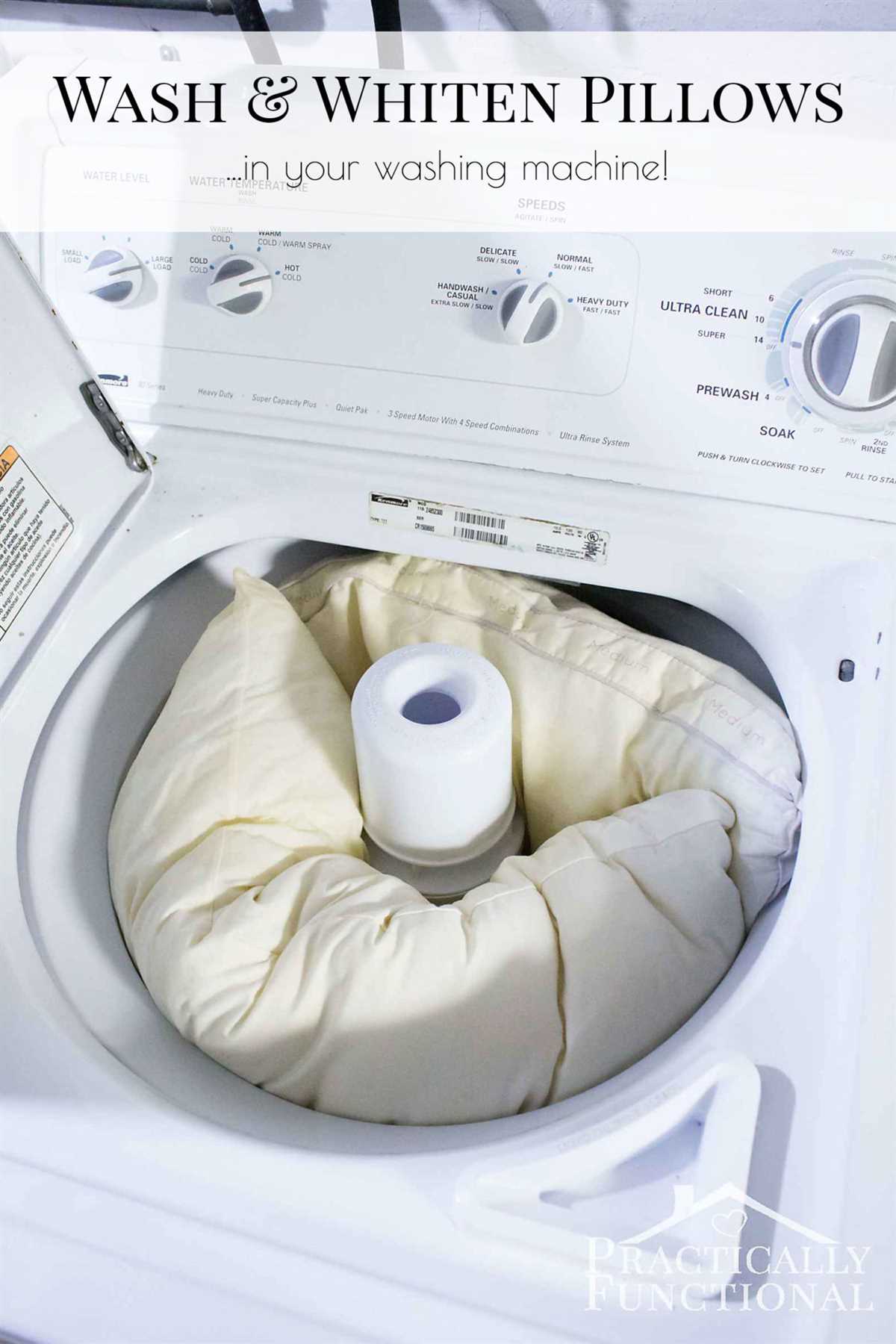
If your pillow has any stains, it’s a good idea to spot treat them before washing. Use a mild detergent or stain remover and gently scrub the stained areas. Let it sit for a few minutes, then rinse off the detergent.
Step 4: Load the Washing Machine
Place your pillows in the washing machine, making sure not to overload it. Adding a couple of towels can help balance the load.
Step 5: Choose the Right Settings
Set the washing machine to a gentle or delicate cycle with warm water. Avoid using hot water as it can damage the filling of the pillows.
Step 6: Add Detergent
Add a small amount of mild detergent to the machine. Avoid using bleach or fabric softener as they can cause damage to the pillows.
Step 7: Rinse Twice
After the wash cycle is complete, run an additional rinse cycle to ensure all the detergent is thoroughly removed from the pillows.
Step 8: Dry the Pillows
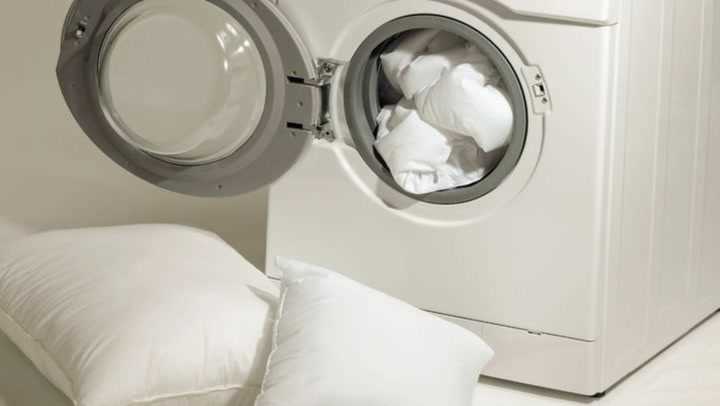
Remove the pillows from the washing machine and gently squeeze out any excess water. Place them in the dryer and add a couple of clean tennis balls or dryer balls to help fluff the pillows during the drying process.
Step 9: Choose the Right Settings for Drying
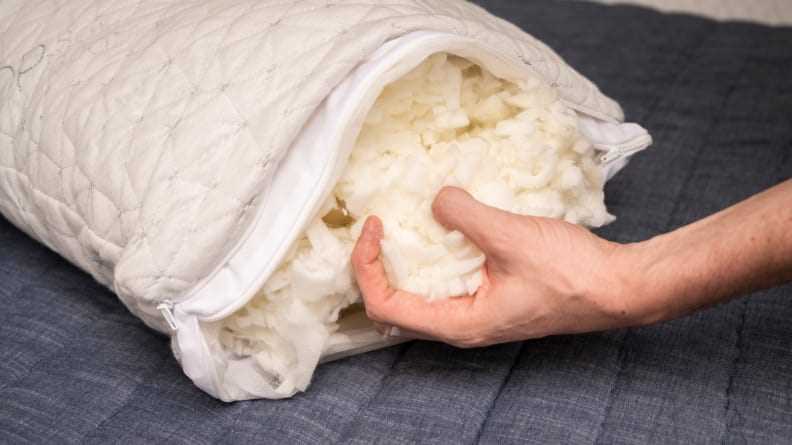
Set the dryer to a low heat setting and tumble dry the pillows until they are completely dry. Stop the dryer occasionally to fluff and separate the pillows to ensure even drying.
Step 10: Fluff and Replace
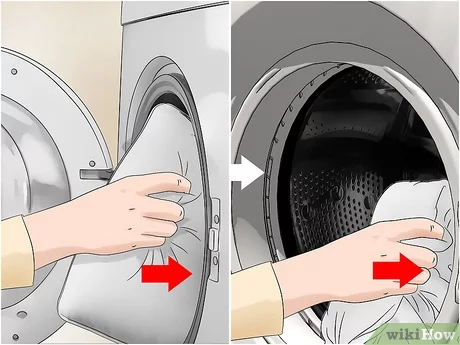
Once the pillows are dry, fluff them to restore their shape. Check for any remaining damp spots and if necessary, let them air dry for a little longer. Finally, replace the pillowcase and any protective covers or shams and your pillows are ready to use again.
Following these steps will help ensure that your pillows are properly cleaned and maintained, keeping them fresh and comfortable for a longer time.
Tips for Drying Pillows After Washing
After washing your pillows, it’s important to dry them thoroughly to avoid mold and mildew growth. Here are some tips to help you effectively dry your pillows:
- Read the care label: Before drying your pillows, read the care label to check if they are machine-dryable or if they need to be air-dried.
- Use a dryer: Most pillows can be effectively dried in a dryer. Place them in the dryer along with a few clean tennis balls or dryer balls to help fluff them up.
- Set the dryer to a low heat setting: High heat can damage the filling of the pillows, so it’s best to set the dryer to a low heat setting. Check the care label for specific instructions.
- Check for dampness: After the recommended drying time, remove the pillows from the dryer and check for any damp spots. If they are still damp, place them back in the dryer for additional drying time.
- Consider air-drying: If your pillows are labeled as air-dry only or if you prefer air-drying, you can hang them outside on a clothesline or lay them flat on a clean surface indoors.
- Fluff the pillows: Once your pillows are completely dry, give them a good fluff to distribute the filling evenly. This will help restore their shape and comfort.
Following these tips will ensure that your pillows are thoroughly dried and ready for use. Always refer to the care label for specific instructions and recommendations.
Alternative Methods: How to Clean Pillows Without a Washing Machine
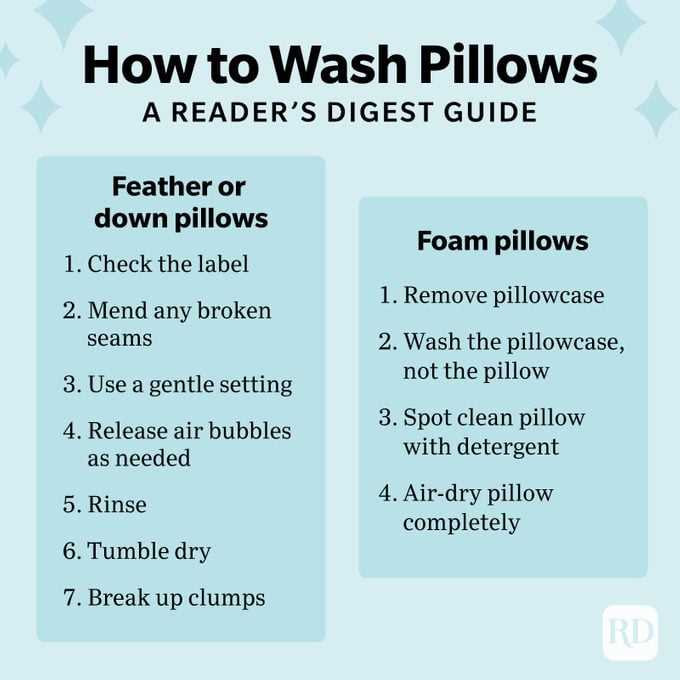
If you don’t have access to a washing machine or prefer not to use one, there are alternative methods to clean your pillows. While these methods may require a bit more effort, they can be effective in removing dirt, dust, and stains from your pillows.
1. Hand Washing
Hand washing is a great option for cleaning pillows without a washing machine. Here’s how you can do it:
- Fill a sink or basin with warm water and add a small amount of mild detergent.
- Submerge the pillow in the water and gently agitate it to work the detergent into the fabric.
- Let the pillow soak for about 10-15 minutes.
- Drain the soapy water and refill the sink or basin with clean water.
- Rinse the pillow thoroughly until all the soap is removed.
- Squeeze out excess water from the pillow, being careful not to wring or twist it.
- Allow the pillow to air dry completely before using it again.
2. Spot Cleaning
If you only need to clean a specific area or spot on your pillow, spot cleaning can be a quick and effective method. Follow these steps:
- Dampen a clean cloth with water and a small amount of mild detergent.
- Gently blot the stained or soiled area of the pillow with the damp cloth.
- Continue blotting until the stain is removed or lightened.
- Using a clean, damp cloth, blot the area again to remove any remaining detergent residue.
- Allow the pillow to air dry completely.
3. Sun and Fresh Air
Another natural way to freshen up your pillows is by exposing them to sunlight and fresh air. Follow these steps:
- Remove the pillowcase and any protective covers.
- Hang the pillows outside on a clothesline or lay them flat in direct sunlight.
- Leave the pillows outside for a few hours to allow them to air out and absorb the sunlight.
- Flip the pillows over to ensure both sides are exposed to the sun.
- Bring the pillows back inside and give them a final shake to remove any lingering dust.
4. Vacuuming
Regularly vacuuming your pillows can help keep them clean and free of dust and dirt. Follow these steps:
- Remove the pillowcase and any protective covers.
- Using a vacuum cleaner with a upholstery attachment, gently vacuum both sides of the pillow.
- Pay extra attention to the seams and edges to remove any trapped dirt or debris.
- Repeat the process on both sides of the pillow.
- Replace the pillowcase and any protective covers before using the pillows again.
Remember to check the care instructions on your pillows before attempting any cleaning method. Some pillows may have specific instructions or restrictions on cleaning. Following the proper care guidelines will help ensure the longevity and cleanliness of your pillows.
FAQ
Can I wash my pillow in the washing machine?
Yes, you can generally wash most pillows in the washing machine. However, it’s important to check the care instructions on your pillow’s label before proceeding.
What type of pillows can be washed in the washing machine?
Most types of pillows can be washed in the washing machine, including polyester, down, and memory foam pillows. However, it’s important to check the care label on your pillow to make sure it’s safe for machine washing.
How should I prepare my pillow for washing?
Before washing your pillow, it’s a good idea to remove any pillowcases or covers and check for any rips or tears. If there are any, you may want to mend them before washing. You should also check the care label for any specific instructions on preparing the pillow for washing.
What should I use to wash my pillow?
You can typically use a mild detergent when washing your pillow. However, it’s important to check the care label for any specific instructions or restrictions. Some pillows may require a specific type of detergent or recommend using a gentle cycle.
Can I put my pillow in the dryer after washing it?
Yes, you can usually put your pillow in the dryer after washing it. However, it’s important to check the care label for any specific instructions. Some pillows may need to be air-dried or dried on a low heat setting.













